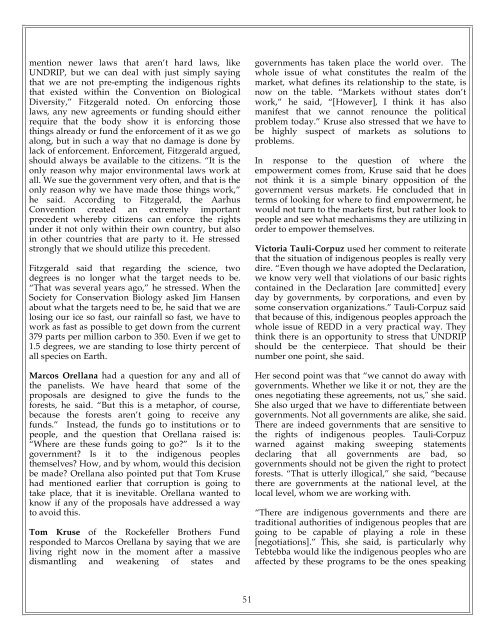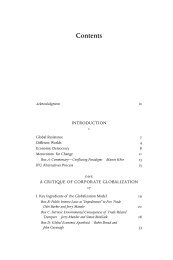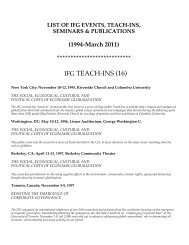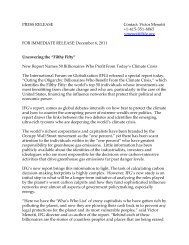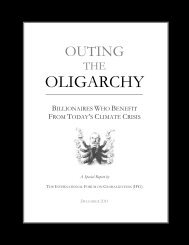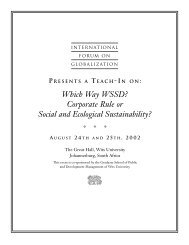UNDRIP Report - English FINAL - International Forum on Globalization
UNDRIP Report - English FINAL - International Forum on Globalization
UNDRIP Report - English FINAL - International Forum on Globalization
Create successful ePaper yourself
Turn your PDF publications into a flip-book with our unique Google optimized e-Paper software.
menti<strong>on</strong> newer laws that aren’t hard laws, like<br />
<str<strong>on</strong>g>UNDRIP</str<strong>on</strong>g>, but we can deal with just simply saying<br />
that we are not pre-empting the indigenous rights<br />
that existed within the C<strong>on</strong>venti<strong>on</strong> <strong>on</strong> Biological<br />
Diversity,” Fitzgerald noted. On enforcing those<br />
laws, any new agreements or funding should either<br />
require that the body show it is enforcing those<br />
things already or fund the enforcement of it as we go<br />
al<strong>on</strong>g, but in such a way that no damage is d<strong>on</strong>e by<br />
lack of enforcement. Enforcement, Fitzgerald argued,<br />
should always be available to the citizens. “It is the<br />
<strong>on</strong>ly reas<strong>on</strong> why major envir<strong>on</strong>mental laws work at<br />
all. We sue the government very often, and that is the<br />
<strong>on</strong>ly reas<strong>on</strong> why we have made those things work,”<br />
he said. According to Fitzgerald, the Aarhus<br />
C<strong>on</strong>venti<strong>on</strong> created an extremely important<br />
precedent whereby citizens can enforce the rights<br />
under it not <strong>on</strong>ly within their own country, but also<br />
in other countries that are party to it. He stressed<br />
str<strong>on</strong>gly that we should utilize this precedent.<br />
Fitzgerald said that regarding the science, two<br />
degrees is no l<strong>on</strong>ger what the target needs to be.<br />
“That was several years ago,” he stressed. When the<br />
Society for C<strong>on</strong>servati<strong>on</strong> Biology asked Jim Hansen<br />
about what the targets need to be, he said that we are<br />
losing our ice so fast, our rainfall so fast, we have to<br />
work as fast as possible to get down from the current<br />
379 parts per milli<strong>on</strong> carb<strong>on</strong> to 350. Even if we get to<br />
1.5 degrees, we are standing to lose thirty percent of<br />
all species <strong>on</strong> Earth.<br />
Marcos Orellana had a questi<strong>on</strong> for any and all of<br />
the panelists. We have heard that some of the<br />
proposals are designed to give the funds to the<br />
forests, he said. “But this is a metaphor, of course,<br />
because the forests aren’t going to receive any<br />
funds.” Instead, the funds go to instituti<strong>on</strong>s or to<br />
people, and the questi<strong>on</strong> that Orellana raised is:<br />
“Where are these funds going to go?” Is it to the<br />
government? Is it to the indigenous peoples<br />
themselves? How, and by whom, would this decisi<strong>on</strong><br />
be made? Orellana also pointed put that Tom Kruse<br />
had menti<strong>on</strong>ed earlier that corrupti<strong>on</strong> is going to<br />
take place, that it is inevitable. Orellana wanted to<br />
know if any of the proposals have addressed a way<br />
to avoid this.<br />
Tom Kruse of the Rockefeller Brothers Fund<br />
resp<strong>on</strong>ded to Marcos Orellana by saying that we are<br />
living right now in the moment after a massive<br />
dismantling and weakening of states and<br />
governments has taken place the world over. The<br />
whole issue of what c<strong>on</strong>stitutes the realm of the<br />
market, what defines its relati<strong>on</strong>ship to the state, is<br />
now <strong>on</strong> the table. “Markets without states d<strong>on</strong>’t<br />
work,” he said, “[However], I think it has also<br />
manifest that we cannot renounce the political<br />
problem today.” Kruse also stressed that we have to<br />
be highly suspect of markets as soluti<strong>on</strong>s to<br />
problems.<br />
In resp<strong>on</strong>se to the questi<strong>on</strong> of where the<br />
empowerment comes from, Kruse said that he does<br />
not think it is a simple binary oppositi<strong>on</strong> of the<br />
government versus markets. He c<strong>on</strong>cluded that in<br />
terms of looking for where to find empowerment, he<br />
would not turn to the markets first, but rather look to<br />
people and see what mechanisms they are utilizing in<br />
order to empower themselves.<br />
Victoria Tauli-Corpuz used her comment to reiterate<br />
that the situati<strong>on</strong> of indigenous peoples is really very<br />
dire. “Even though we have adopted the Declarati<strong>on</strong>,<br />
we know very well that violati<strong>on</strong>s of our basic rights<br />
c<strong>on</strong>tained in the Declarati<strong>on</strong> [are committed] every<br />
day by governments, by corporati<strong>on</strong>s, and even by<br />
some c<strong>on</strong>servati<strong>on</strong> organizati<strong>on</strong>s.” Tauli-Corpuz said<br />
that because of this, indigenous peoples approach the<br />
whole issue of REDD in a very practical way. They<br />
think there is an opportunity to stress that <str<strong>on</strong>g>UNDRIP</str<strong>on</strong>g><br />
should be the centerpiece. That should be their<br />
number <strong>on</strong>e point, she said.<br />
Her sec<strong>on</strong>d point was that “we cannot do away with<br />
governments. Whether we like it or not, they are the<br />
<strong>on</strong>es negotiating these agreements, not us," she said.<br />
She also urged that we have to differentiate between<br />
governments. Not all governments are alike, she said.<br />
There are indeed governments that are sensitive to<br />
the rights of indigenous peoples. Tauli-Corpuz<br />
warned against making sweeping statements<br />
declaring that all governments are bad, so<br />
governments should not be given the right to protect<br />
forests. “That is utterly illogical,” she said, “because<br />
there are governments at the nati<strong>on</strong>al level, at the<br />
local level, whom we are working with.<br />
“There are indigenous governments and there are<br />
traditi<strong>on</strong>al authorities of indigenous peoples that are<br />
going to be capable of playing a role in these<br />
[negotiati<strong>on</strong>s].” This, she said, is particularly why<br />
Tebtebba would like the indigenous peoples who are<br />
affected by these programs to be the <strong>on</strong>es speaking<br />
51


